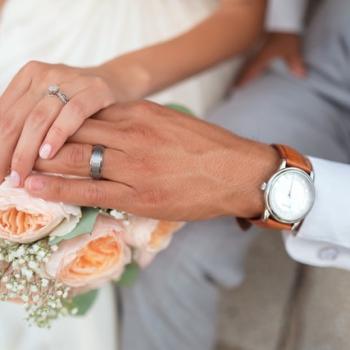
In Islam, marriage is a sacred bond where two souls complete half their deen (faith). It’s also considered a social contract with varied duties and responsibilities attached to it. And, it is a Sunnah of the Messenger of Allah (ﷺ) and an obligation upon every Muslim.
It is stated in the Quran:
“He it is Who created you from a single soul, and of the same did He make his spouse, that he might find comfort in her” (vii. 189).”
There are numerous verses in the Quran that discuss the importance of marriage and its purpose. Allah also says in the Quran:
“And among His signs is this, that He created for you mates from among yourselves, that ye may dwell in tranquillity with them, and He has put love and mercy between your (hearts): verily in that are Signs for those who reflect.” (30:21)
The above verse clearly states the importance of marriage in Islam and the love that should exist between husband and wife. Allah has created us as social beings and has given us the need to love and be loved. Marriage is the perfect way to fulfil this need as it is a union based on love, compassion, and understanding.
However, when it comes to choosing a life partner, Muslims are advised to marry someone who shares their faith. This is because Islam is a way of life and marriage is a key part of that. By marrying someone of the same faith, both husband and wife will be able to support and help each other in every aspect of their lives. They will be able to share the same values, beliefs, and goals in life, which will make their relationship stronger.
But what if you want to have an interfaith marriage?

Can Muslims have an interfaith marriage?
The Islamic ruling for inter-faith marriage is different for men and women. A Muslim man can marry a woman from “the people of the book” as long as she is chaste and believes in one God. The People of the Book are identified in Islam as Jews and Christians. They’re considered to have been guided by previous Revelations, generally through scripture – including Torah (tawrat), Psalms (zabur), and Gospel (injeel). This is also allowed as Muslims believe in the earlier prophets that they follow. And because of some similarities in the faith. Also, these women they marry can be given the liberty to follow their religion and they should not interfere in his religion.
“As to marriage, you are allowed to marry the chaste from among the believing women and the chaste from among those who have been given the Book before you (are lawful for you); provided that you have given them their dowries, and live with them in honour, not in fornication, nor taking them as secret concubines.”Qur’an (5:5).
This verse of the Quran clearly states that a Muslim man can marry a woman from the people of the book. But Muslim men are prohibited from marrying idolators. If they wish to marry them, they need to revert them to Islam. And then that marriage will be halal (permissible) for them.
“Do not marry idolatresses unless they believe; a believing woman is better than an idolatress, even if you like her. Nor shall you give your daughters in marriage to idolatrous men, unless they believe. A believing man.is better than an idolater, even if you like him. These invite us to Hell, while GOD invites us to Paradise and forgiveness, as He wills. He clarifies His revelations for the people, that they may take heed.” [2:221].

However, the ruling for Muslim women is different from that of men. A Muslim woman can only marry a Muslim man. She is not allowed to marry the people of books or idolators as stated in the verse above. The main reason behind this is in Islam men are considered the protectors and maintainers of women. It’s an obligatory duty on them commanded by Allah(SWT).
“Men are the protectors and maintainers of women, because Allah has given the one more (strength) than the other, and because they support them from their means. Therefore the righteous women are devoutly obedient, and guard in (the husband’s) absence what Allah would have them guard”. Surah Nisa- 34
As men are the maintainers of women, a non-muslim man may not respect her practising her faith. Like he may not like her fasting during the month of Ramadan or prevent her from wearing a hijab or modest clothing.
Let’s understand this with an example…
Let’s assume that a woman marries a non-muslim man without him reverting to Islam and the marriage progresses and the family grows. The children are called by their father’s name and generations of children will be named as non-muslims.
Many people will object that this is unfair for women as they cant have an interfaith marriage. But if we keep our feminist thinking aside and ponder over it practically, these are valid reasons. However, Muslims consider Allah(SWT) rules mentioned in the Quran and hadith above all the other concepts of the world.
We hope this article has helped provide some clarity on the topic of Muslim interfaith marriage. If you have any further questions, please feel free to leave a comment.












